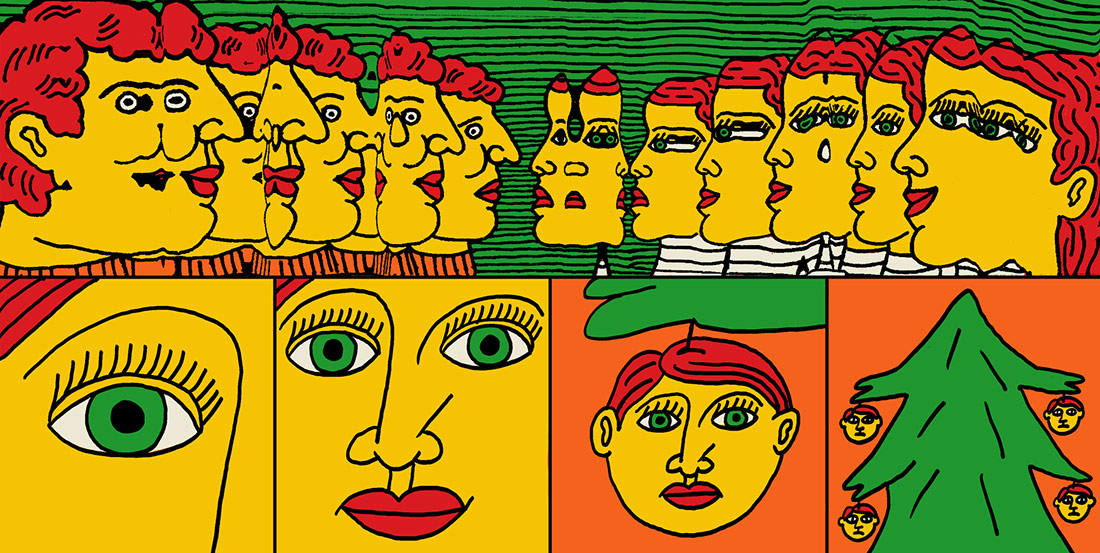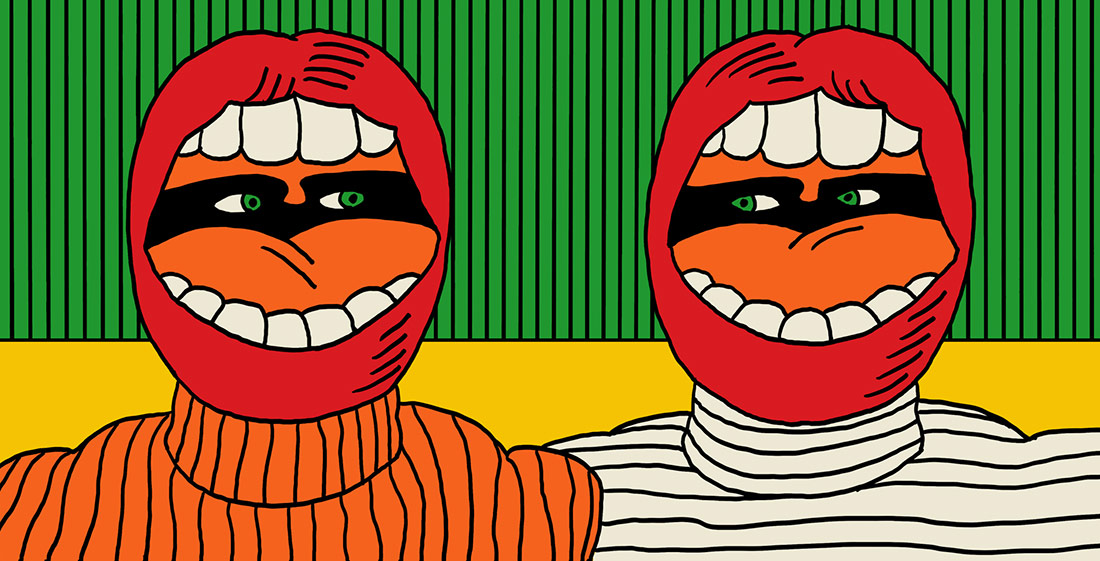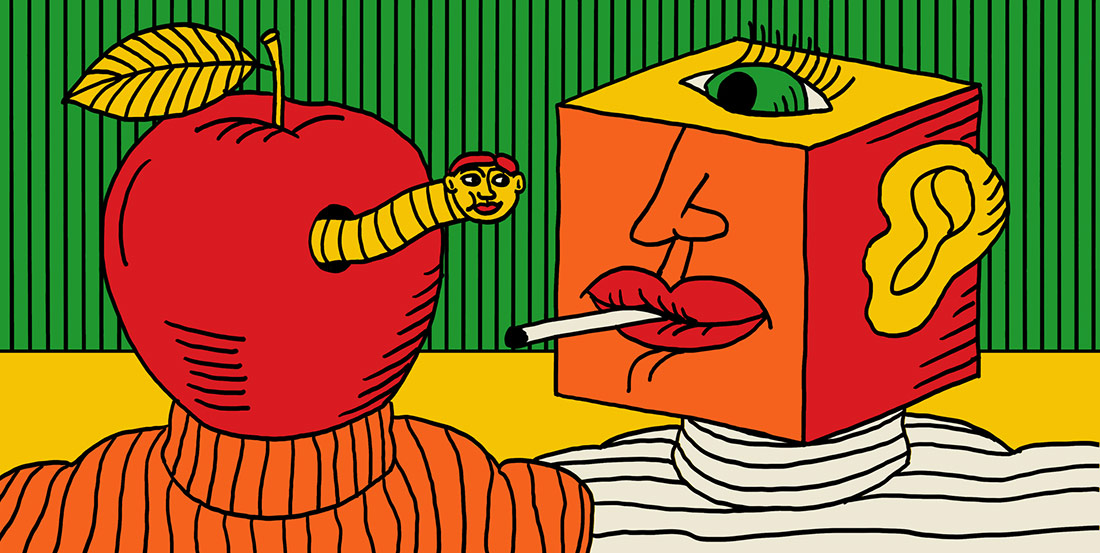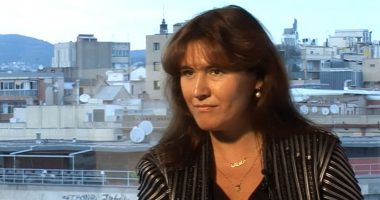Enric and Charlotte go back to the village to spend Christmas with the family. The smell of Christmas cooking, sweets and after-dinner chats. An encounter with the past to start afresh.
“I had to cancel a gig at Clamores because if I don’t go home for dinner on Christmas Eve my mother will have a fit!”
Enric has been living for almost ten years in Madrid, the city he chose to make his name as a singer-songwriter, seeing that neither in his hometown nor in Barcelona was he very successful.
“In Madrid it’s a different story, that’s where everything happens. Madrid is the epicentre.”
When he traipsed around the half-empty bars of Barcelona with his guitar, he used to introduce himself as Enric Moreso, his real name, in fact. In Madrid he goes by the name of Henry. Henry More. And it more or less works, because with the gigs he can afford to just work part time at an admin agency. He always plays between one to three gigs a week, and he’s been charging a minimum fee for some time, regardless of whether or not anyone comes. If they want artists to come for free, let the youngsters go, he’s already turned forty and he’d be doing the sector no favours if he accepted jobs for peanuts. But to get a gig at one of the big venues is really hard. It might happen once a year, usually alongside other artists as part of a festival. But this time, at Clamores, they’d chosen him specifically. He was the only artist booked to play on Christmas Eve in that venue where, after the Christmas Eve supper and before the 1960s disco, he would welcome the punters with his best repertoire of clearly Joaquín Sabina-inspired numbers. All his own, of course, and in Spanish. He’s even got a hit called “Tu mirada” which they play from time to time on Cadena Dial radio.
“D’you know, Enriquet, how upset your gran will be if you don’t come to spend Christmas in the village? […] Please do me the favour of not talking any more nonsense and just get on a train and get yourself home! How much are they paying you for this gig? Fifty euros? Your dad’ll pay you, please, we’ve had a good harvest this year, for fifty stupid euros you’ll miss this time with your family, you should be ashamed Enriquet, I don’t know […] Even if it’s a hundred, I don’t care! You can’t put a price on your last Christmas with your gran, she’s ninety-four already. And you with your guitar, like an idiot, singing for a bunch of nobs in Madrid! Besides, this year your uncle and auntie from Perpignan are coming, Madalena and Jacquie, you know they come every two years. And I think the girl’s coming, apparently she’s got divorced and this year she’s coming with them, what’s she supposed to do, poor thing.
The girl is Charlotte and she’s three years older than Enric. Three years exactly, because, as it happens, they were born on the same day of February. Since they were little and until they were quite grown up, he only saw her for a week in the summers and every other Christmas, the years they had to spend the holidays with the family of Madalena, his mother’s sister. When Enric was growing up, he was absolutely fascinated by Charlotte, who spoke in that Catalan of Northern Catalonia with them and with her mother, and in French with her father. So much so that he’s spent his life comparing all the women he’s met with her, all of them unfavourably. Tall, slim, when she was a teenager she started painting her lips bright red and wearing her hair short or tied up, so that you could always see the back of her neck. Enric, disarmed by the exoticism of his North-Catalan cousin, had always felt that she must have found him a bit backward, because he couldn’t get his words out when he was with her, and he often just froze.
Now it must have been ten years since he last saw her, since she got married to Mark (that was when Enric decided to go and try his luck in Madrid), a French businessman, handsome and square, always with a tie, shorter than her, and with whom Enric never predicted a good marriage. They didn’t have any children. So, now that he knows he’s going to see Charlotte again, missing the gig at Clamores doesn’t seem such a big deal.
He arrives at the house in Sant Jaume d’Enveja early in the afternoon on the 24th of December. The air smells of Christmas meat and vegetable stock. His mother and auntie Madalena, who arrived the day before with her husband and her daughter, have taken charge of cooking and decorating everything. His dad is spending as much time as possible on the allotment, oblivious to the festivities and the visitors, trying to pretend that nothing special is happening, except when he sits down to eat, and then, of course, he expects to have every dish, every nibble, every sweet.
“How nice it would be to have a baby crawling around here now it’s Christmas, wouldn’t it, Mada? But, my goodness! We’ve been very unlucky, my dear.”
“Yes, because this one’s already past her prime, it’s all about her career, all about her career! Her and that toad Mark, and in the end, what was it all for? The apartment sold and no baby! Well, what can I say, if you’ve got to get divorced it’s better not to have children in the way, because it just leads to acrimony.”
“That’s right.”
“And what about this one?” Referring now to Enric, who still hasn’t taken off his brown hat and his beige scarf from around his neck (he adopted these accessories as his personal trademark some time ago), and his tatty jacket in the same unfashionable brown as his hat. “He’ll have to find himself a young girlfriend because the ones his age won’t give him any children either.”
Enric and Charlotte exchange glances and, for the first time in his life, or so it seems to him, they connect. They connect in what for them is the tedium of being surrounded by so much banality. Of having landed on the planet of scot-free passive-aggressiveness that is the family. He gives two kisses to the mother, his aunt and his grandmother, who’s sitting in the kitchen gazing into space, and he saves the last two kisses for Charlotte, who returns the gesture unruffled. She smells very nice. He doesn’t. He holds onto the belief that showering every day is not the way of the true artist. But this evening he will have a shower and put on some aftershave and try to sit next to her at dinner.
Charlotte is a sommelier. She works for one of the best French wineries. She has twice been finalist for the award for France’s best young sommelier and she never stops travelling. She spends a lot of money on anti-ageing creams and has a personal trainer who makes her do a circuit around the city on Mondays and another one at the gym on Wednesdays; a nutritionist who only lets her indulge at times of the year like Christmas if she’s managed to lose a couple of pounds beforehand. Hairdresser, beautician and masseuse once a week. A whole room to house her collection of bags and shoes. She’s holding up well, really, she looks great, that’s what everyone tells her, even though her period has been playing her up for a few months now. And no one understands why Mark left her. She understands – she had a thorough search of his Instagram account and came to the conclusion that he was messing around with a girl from work. A classic. This girl’s sure to give him the children he didn’t have with her. Anyway, she wouldn’t know what to do with a baby at this age.
“Come on, Enriquet, sing us something, won’t you?” asks Madalena, who still bursts out laughing when she sees him singing, she’s always found it comical. His dad, on the other hand, gets in a huff, and every year ends up saying “is this what we broke our backs to send you to university for?” He goes for a safe shot and sings “Tu mirada,” throwing knowing looks at Charlotte, feeling buoyed up by the wine he drank with dinner. She rolls her eyes mid-song, gets up and goes upstairs, which he interprets as clearly meaning “follow me.” When the song finishes, he jumps up, grabs his hat and scarf, and heads up the stairs to the hideaway on the rooftop where he caught her smoking a cigarette thirty years ago. As he climbs the stairs, he keeps saying to himself “you’re a grown man, you’re seductive.” First, however, he stops at the upstairs bathroom to make sure he has nothing between his teeth or a bogey poking out of one of his nostrils.
He almost falls on his back when he looks in the mirror sees a boy who looks just like him when he was barely fourteen (although with a grubby hat and a suspiciously beige scarf). He touches the boyish face that looks back at him and sees that it’s missing the beard that he wore meticulously badly shaved and that [he thinks] made him look so interesting. He wants to let out a scream, but he holds it in because the last thing he wants now is for the whole family to come running to the bathroom. So, with the lightness of weighing twenty kilos less, he scrambles up the stairs to the rooftop. He goes to the little corner behind the laundry room and, sure enough, there she is, the seventeen-year-old Charlotte, with that precocious femme fatale air she had already adopted as a teenager. When he looks at her face, he notices that her eyeliner is smudged and her lipstick is smeared, as if she had food around her mouth, and she looks at him disappointed, as if she’s been waiting for him.
Enriquet can’t muster even half a word that would measure up to the forcefulness of Charlotte, who pulls him to her, strokes him with her finger on the left side of his face until, with the same index finger, she covers his mouth and looks at him, very serious. Terrified and with her finger still pressed to his lips, he manages to say: “And now what do we do, now that we’re so young again?”
She, categorical as she always has been, assures him:
“Now we will live again, but without being pathetic.”






Leave a comment